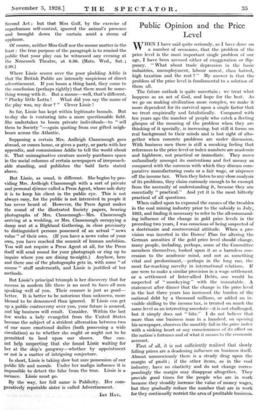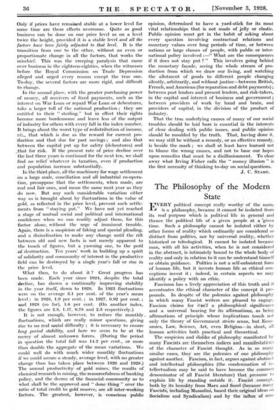Public Opinion and the Price Level
WHEN I have said quite seriously, as I have done on a number of occasions, that the problem of the price level is the most important single problem of our age, I have been accused either of exaggeration or flip- pancy. " What about trade depression in the basic industries, unemployment, labour unrest, class hatred, high taxation and the rest ? " My answer is that the problem of the price level is fundamental to a solution of them all.
The future outlook is quite uncertain ; we treat what happens as an act of God, and hope for the best. As we go on making civilization more complex, we make it more dependent for its survival upon a single factor that we treat empirically and fatalistically. Compared with ten years ago the number of people who catch a fleeting glimpse of the meaning of the problem when they arc thinking of it specially, is increasing, but still it forms no real background to their minds and is lost sight of alto- gether when concrete problems are under discussion. With business men there is still a sneaking feeling that references to the price level or index numbers are academic and highbrow, not practical or immediate. They move unfamiliarly amongst its contentions -and feel uneasy as compared with the sureness with which they discuss com- parative manufacturing costs or a fair wage, or sixpence off the income tax. When they listen to any close analysis of its problems, they claim curiously enough to be exempt from the necessity of understanding it, because they are essentially " practical." And yet it is the most bitterly practical of all questions.
When called upon to expound the causes of the troubles in the coal mining industry prior to the subsidy in July, 1925, and finding it necessary to refer to the all-command- ing influence of the change in gold price levels in the preceding two years, I was conscious of being suspected of a doctrinaire and controversial attitude. When a pro- vision was inserted in the Dawes' Plan for altering the German annuities if the gold price level should change, many people, including, perhaps, some of the Committee members themselves, looked upon it as a harmless con- cession to the academic mind, and not as something vital and predominant,—perhaps in the long run, the most far-reaching novelty in international relations. If one were to make a similar provision in a wage settlement or a settlement of Inter-allied Debts, one would be suspected of " monkeying " with the immutable. A statement after dinner that the change in the price level in the last three years has increased the burden of the national debt by a thousand millions, or added an in- visible shilling to the income tax, is treated on much the same level as an interesting anecdote—it is not challenged, but it simply does not " bite." I do not believe that more than one business man in a hundred, on opening his newspaper, observes the monthly fall in the price index with a sinking heart or any consciousness of its effect on the nation's fortunes and of what it means to the economic account.
First of all, it is not sufficiently realized that slowly falling prices are a deadening influence on business itself.
Almost unconsciously there is a steady drag upon the margin of profit ; if the other items, as in the coal industry, have no elasticity and do not change corres- pondingly the margin may disappear altogether. They provide good times for the people who are in work because they steadily increase the value of money wages, but they gradually reduce the number that are in work for they continually restrict the area of profitable busineis. Only if prices have remained stable at a lower level for some time are these effects overcome. Quite as good business can be done on one price level as on a level twice the height, provided it is a stable level and all the factors have been fairly adjusted to that level. It is the transition from one to the other, without an even or proportionate change in all the factors, that works the mischief. This was the creeping paralysis that came over business in the eighteen-eighties, when the witnesses before the Royal Commission on Trade Depression alleged and urged every reason except the true one. To-day, the several factors are more rigid, and difficult to change.
In the second place, with the greater purchasing power of money, all receivers of fixed payments, such as the interest on War Loan or repaid War Loan or debentures, take a larger toll of the national production ; they are entitled to their " sterling," but in effect their rights become more burdensome and leave less of the output of industry for others with every fall in the index number.
It brings about the worst type of redistribution of income, viz., that which is due as the reward for current pro- 'duction and that due for past savings ; and also that between the capital put up for safety (debentures) and ;that for risk. If the present rate of price decline over the last three years is continued for the next ten, we shall find no relief whatever in taxation, even if production and population increase substantially.
In the third place, all the machinery for wage settlement On a large scale, conciliation and all industrial co-opera- tion, presuppose that the settlements, when made, are real and fair ones, and mean the same next year as they do now. But any such considerable variation either way as is brought about by fluctuations in the value of gold, as reflected in the price level, prevent such settle- ments from " staying put." We have not yet reached a stage of mutual social and political and international confidence when we can readily adjust- them, for this -factor alone, without the urge of imminent trouble.
Again, there is a suspicion of faking and special pleading, and a disinclination to make any change until the rift between old and new facts is not merely apparent to the touch of figures, bitt a yawning one, to the peril ,.a destruction. Ten years' work in building up a spirit of solidarity- and community of interest in- the produCtive field can be destroyed by a -single year's fall -or rise in the price level.
What then, to do about it ? Great progress has been made. Each year since -1924, despite the -total .decline, has shown a continually improving stability in the year itself, down to 1928. In 1925 fluctuations were on the average 3.1 per cent. of the year's mean level ; in 1926, 1.9 per cent. ; in 1927, 0.92 per cent. ; sad 1928 (so far), 1.6 per cent. (On another index, the figures are 2.8, 1.47, 0.78 and 2.3 respectively.) It is not enough, however, to reduce the monthly, fluctuations, which are really minor questions, giving rise to no real social difficulty ; it is necessary to ensure long period stability, and here we seem to be at the mercy - of almost unknown forces. (During the period in question the total fall was 14.2 per cent., or more than double the aggregate of the mean variations. We could well do with much wider monthly fluctuations if we could secure a steady, average level, with no greater change than has taken-place between 1926 and 1928.) The annual productivity - of gold mines, the -results of chemical research in mining, the resourcefulness of banking - policy, and the decree of the financial. community as to • what shall be the approved and " done thing " over the - ratio of total credit to gold reserve; are all inter-working • factors. The greatest, however, - is conscious pnblic opinion, determined to have a yard-stick for its most vital relationships that is not made of jelly or elastic. Public opinion must get in the habit of, asking about every question involving contractual relations and monetary values over long periods of time, or between nations or large classes of people, with public or inter- national policy involved :—" What are the consequences if it does not stay put ? " This involves going behind the monetary façade, seeing the whole stream of pro- duction from which we draw our living, and watching the allotment of goods to different people changing silently, arbitrarily, and without justice—between British, French, and American (for reparation and debt payments) ; between past lenders and present lenders, and risk-takers, in the capital and interest of business and government ; between providers of work by hand and brain, and providers of capital, in the division of the product of industry.
That the true underlying causes of many of our social troubles should be laid bare is essential- in the interests of clear dealing with public issues, and public opinion should be moulded by the truth. That, having done it, we may still be without a remedy, or an effective remedy, is beside the mark ; we shall at least have learned not to blame the wrong causes, and not to base our hopes upon remedies that must be a disillusionment. To clear away what Irving Fisher calls the " money illusion " is the first necessity of thinking to-day on social questions.
J. C. STAMP.



















































































































 Previous page
Previous page